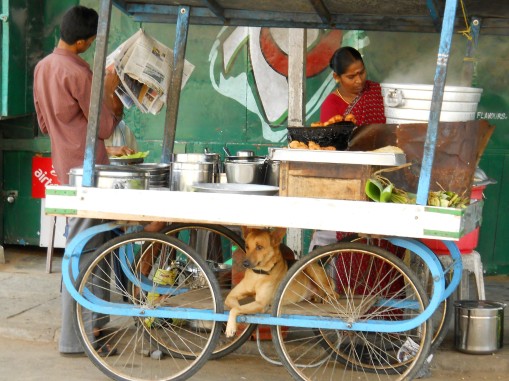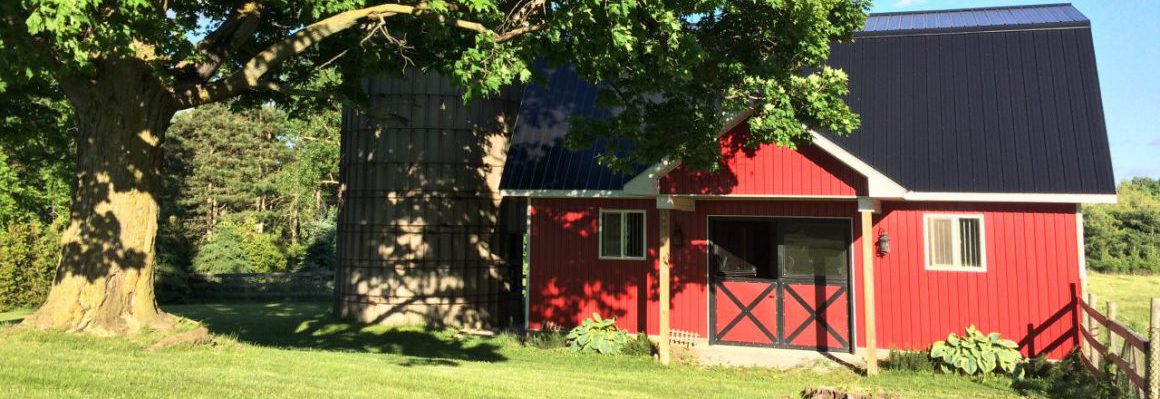Elaine Philpott grew up in the United Kingdom. For as long as she can remember, animals have always been a huge part of her life. As a child, she shared her home with dogs, cats, rabbits and hamsters.
Given her love of animals, it makes perfect sense that she trained to become a veterinary nurse. She worked at a practice in Coventry for 17 years, becoming head nurse, and then at a practice in Scotland for another 13 years.
Next to animals, Elaine’s other love is travelling. She has visited places like Morocco, Kenya, Sri Lanka, Australia, but her favourite destination has always been India.
It was on one of her many visits to India that she met Rachel Wright, an English Veterinary nurse who founded Tree Of Life For Animals (TOLFA). TOLFA is an animal hospital and rescue centre in Rajasthan (a state in northern India). The two women had a long chat, and Elaine offered to help the animals in any way she could.

Several months later, when Elaine had returned to the UK, she received a postcard from Rachel telling her about a shelter in Udaipur called Animal Aid Unlimited. The shelter was looking for a nurse to train their staff and Rachel wondered if Elaine would be interested.
Interested indeed!
Elaine took six weeks unpaid leave from her job in Scotland. Her boss said she could go, “as long as she promised to come back.”
Elaine looks back fondly on her time volunteering at Animal Aid Unlimited. She describes it as “the happiest she had ever been.” After the six weeks, she returned to Scotland and resumed working as a veterinary nurse. But her experience in India had profoundly changed her and what she wanted from life. “After much soul searching, I gave in my notice, sold my small flat, and returned to Animal Aid Unlimited.” She spent two years volunteering at what she calls, “The best shelter in India.”
After about two years, Elaine took a short holiday to a small fishing village in the southern India called Mamallapuram. There is no veterinary doctor in Mamallapuram, so Elaine, armed with a small medical kit that she always carries with her, spent her holiday treating the many sick dogs in the village.

One of the dogs she treated was a female who gave birth to her puppies under a table where Elaine was sitting. One of the pups wasn’t breathing and Elaine resuscitated him, much to the shock of those sitting beside her. Once she explained she was a veterinary nurse, they were happy and even paid for her meal.
The owner of the café made a shelter at the back of the building for ‘Mama’ and her babies. As mid-wife, Elaine visited every day to check on them. One day, Mama wasn’t there. To her horror, Elaine heard that Mama had been killed by a fisherman because she had been sitting on one of his nets on the beach. To this day, bodies of dogs are found on the beach, killed for simply sitting on fishermen’s nets.
The death of Mama made Elaine realize how much the animals in this village needed her. For the next six months, she commuted between Udaipur and Mamallapuram, spending a month at each location. This was not a simple trek, each way involving a three-day journey by train.
Eventually, Elaine made the difficult decision and said goodbye to Animal Aid Unlimited to devote all her time helping the many animals in Mamallapuram. That was twelve years ago.
Elaine credits her mom, who is 87 years old, as being her most keen supporter of the work she does in India. “She is the one I turn to when I need to talk to someone. We have shed many tears over the phone.”
A big part of Elaine’s day is spent befriending the stray dogs. She walks into town every day and visits the dogs, feeding them biscuits, cuddling, and just being with them. Sometimes it takes months to gain their trust.

But once she has it, she’s able to vaccinate them against rabies, distemper and parvo viruses. As there is no local vet, she has to take the stray dogs to Chennai, about an hour away, to be spayed and neutered. She has teamed up with Blue Cross of India to help catch and transport the dogs to Chennai. To date, Elaine estimate she has spayed or neutered 700 dogs.
As there is no animal shelter in Mamallapuram, after the dogs are vaccinated, spayed and/or neutered, they are returned to the streets. However, there are occasions when an animal is too sick to leave unattended. In those cases, Elaine or someone else will take the animal home until they are well enough to be released.


Sometimes, Elaine has even been able to find homes for the dogs. She says she has “lost count of the number of pups I have taken home, treated, and then re-homed.”
One of the wonderful outcomes of Elaine taking care of the dogs, is that her compassion for animals has spread to others living in the community. “People have changed their attitude toward dogs We are always being told if there is a dog with problems in need of treatment.”
 In fact, Elaine now has a team helping her take care of the animals. Christina Wong, a woman from Switzerland, has lived in Mamallapuram for many years. She not only takes in dogs, but also supplies dog food to the many people feeding the local street dogs.
In fact, Elaine now has a team helping her take care of the animals. Christina Wong, a woman from Switzerland, has lived in Mamallapuram for many years. She not only takes in dogs, but also supplies dog food to the many people feeding the local street dogs.
A woman named Susheela, who lives in Mamallapuram part of the year, looks after the village dogs and played a huge part in raising funds to buy an ambulance. And a local man, named Murali, feeds and cares for the street dogs, and drives the ambulance.
Though Elaine’s main focus is helping the street dogs, she also cares for other animals, such as cats, monkeys, birds, and owls.

Charley was rescued when he was just a kitten. He and Elaine have been sharing a home for twelve years.

Gizzy was another kitten Elaine rescued. He was gravely hurt by dogs when he was just six weeks old. And though he recovered, he is paralyzed on one side of his face. But like Charley, there is a happy ending for Gizzy as well. He now lives with Elaine’s ex-landlord and is “thoroughly spoiled.”
Recently, Murali rescued a monkey who had been electrocuted. The poor monkey suffered very serious injuries. Murali took him to a shelter in Chennai, where he is recovering from major surgery.
For Elaine, the best part is taking in sick dogs, helping them heal, returning them to the streets, and watching them run off and join their friends. She loves seeing dogs she has known as puppies reach the age of ten or twelve years old, living happy contented lives on the streets. She is also delighted when she sees them being cared for and fed by local shop owners and food stalls.

Elaine has made strides in improving the lives of stray dogs but she knows there is still much to do. One of the hardest parts for Elaine is witnessing the dire condition of many of the stray dogs—mangy, emaciated, ill. It is also incredibly difficult to see people being deliberately cruel to dogs—hitting them, beating them, even killing them.

Elaine says there is no comparison between the way animals are treated in the west to the way they are treated in India. She believes part of the reason is because many people are struggling to survive themselves and can’t worry about the dogs. But she is hopeful things are improving.
She believes attitudes about animal welfare are slowly changing for the better in India—especially with the younger generation. Many shelters and NGO’s are now making themselves heard, as they give voice to the animals, who for far too long have been terribly mistreated.
When asked the one thing she would change in the world if she could, Elaine says, “I don’t expect everyone to like animals, but to go out of your way to be cruel and hurt them, for me, is very difficult to tolerate. I wish people would accept that a dog wants to sleep in the shade, or lie in front of a shop or house and just let them be.”
For more information about all the wonderful things Elaine does to help India’s street dogs, visit her facebook page: https://www.facebook.com/CareProjectForStreetDogsIndia/
If you would like to donate to help Elaine help the stray dogs of India, please go to https://www.gofundme.com/f/care-for-street-dogs-india









